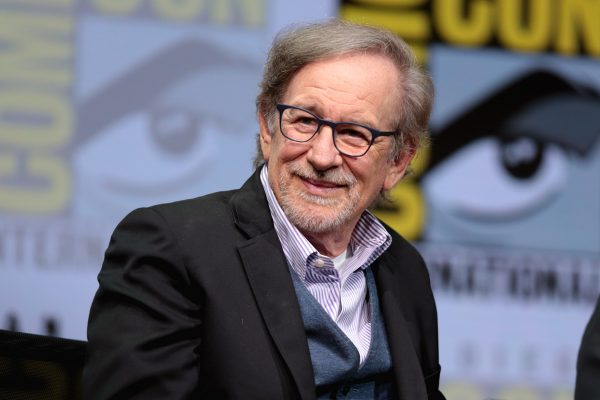“Ready Player One:” Spielberg In His Element
Steven Spielberg speaking about “Ready Player One” at the 2017 San Diego Comic Con International. (GAGE SKIDMORE VIA FLICKR)
April 18, 2018
Over the five decades that Steven Spielberg has spent making movies, one theme has been prevalent in all of them: hope—whether that means hope for a better future, hope for those imprisoned in concentration camps or even just hope that the giant shark doesn’t eat the sheriff. However, many have criticized Spielberg’s insistence on preaching his idealism in his work, and it is difficult to disagree that his films can sometimes come off as maudlin or overly sentimental. Some go so far as to call Spielberg a hack filmmaker or someone whose films are simplistic fantasy fare with no depth or nuance, especially when compared to the other artists of his generation such as Martin Scorsese, Brian De Palma and Francis Ford Coppola.
When others were making “Scarface,” “Taxi Driver” and “The Godfather,” Spielberg was busy at work on “Jaws,” “E.T.” and “Raiders of the Lost Ark.” It can be easy to dismiss Spielberg’s filmography as nothing more than shallow blockbuster entertainment, especially when his peers seem intent on making “very important movies” while Spielberg appears much more interested in being a showman than a philosopher. But this sort of thought misses the point of his movies entirely and is emblematic of a greater problem in the modern pop culture landscape: a bizarre worship of the “real,” the “gritty” and the “dark.” Spielberg’s films nary ever feature the sort of depth of depravity that his contemporaries’ films always featured. Yet, this is where Spielberg’s strengths lie, and to underestimate that is to deeply understate his value as an artist. There is perhaps no film that truly encapsulates Spielberg’s relentless optimistic drive than his latest outing: “Ready Player One.”
Truly, only Spielberg could come out with a science fiction blockbuster three months after releasing “The Post,” an Academy Award contender starring Tom Hanks and Meryl Streep. Watching Spielberg’s filmography in order must seem like witnessing an atonal mess—but that ability to take disparate tones, smash them together and have them make sense is exactly what was needed for a feature adaptation of Ernest Cline’s seminal novel “Ready Player One.” The book and film are set in the Oasis, a virtual space where everyone goes in order to escape the dreary lives they lead in their increasingly dystopian world. The plot revolves around the hunt for the Easter Egg, a mythical object left behind by the Oasis’s late creator, James Halliday (Mark Rylance), an odd and eccentric man who was obsessed with the ephemera of his youth. Whoever finds the Easter Egg inherits Halliday’s obscene wealth and total control of the Oasis—and thus the everyday lives of most of the planet.
On the surface, it very much feels like a paint-by-the-numbers young adult science fiction plot, just with an overabundance of pop culture references and visual callbacks to seemingly every piece of entertainment under the sun. Whether it be as obscure as “Silent Running” or as popular as “Back to the Future,” “Ready Player One” never misses an opportunity to pay homage to something in its endless catalogue of visual sight gags or jokes. But there is much more to “Ready Player One” than a brief surface-level analysis will provide, and so the hard-nosed movie buffs of the Filmmaking Club at Fordham College at Lincoln Center (FCLC) were consulted for their opinion on the new film. Tommy Cunningham, FCLC ’21, reported with a glowing review: “‘Ready Player One’ is Spielberg playing Ozymandias, only the power trip is replaced with the biggest most beautiful heart ever conceived.” Others, like Luke Momo, FCLC ’19, applauded the acting, with particular praise for the female lead: “Olivia Cooke has arrived and it’s kind of magic. It’s as if by fate she was given all of the heart, charm and grace her contemporaries sorely lack.” A trend is obvious; there is something different yet familiar about “Ready Player One” and it can only be explained by that effervescent Spielberg magic.
People have fallen in love with this movie because of Spielberg’s sentimentality and optimism. This is a film that functions as a love letter to the very notion of nostalgia; the secret is Mark Rylance’s Halliday, whose strangeness is matched only by the subdued eagerness of Rylance’s portrayal. Halliday, in many ways, is emblematic of Spielberg himself: using the film—like the Oasis and the Easter Egg—as a tool to examine and contextualize his legacy. Yet, there is no cynicism and no tiredness. Spielberg is sending a message to all the cynics of the world: hope and optimism are paramount, especially in a world that feels like it’s constantly falling apart. In this day and age, what message could be more important?













